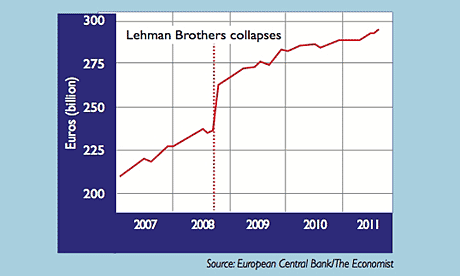
Time is running out for the eurozone. As more and more countries’ bond yields shoot up, the risk of indebted countries being shut out of the markets and having to default is growing. That raises the spectre of a chaotic break-up of the euro and another banking crisis. This prospect in turn is leading to further debt sales and higher yields. The European Central Bank (ECB) “is the only institution with the power to reverse a self-fulfilling panic”, says The Economist. Hence the calls for it to fire its ‘silver bullet’.
So far, the ECB has bought limited quantities of sovereign debt to keep a lid on yields. To save the euro, however, it would need to print money on a massive scale and buy enough sovereign debt to “keep bond prices up [and yields down] for good”, as the FT puts it. The snag is that the Maastricht Treaty forbids the ECB to lend directly to governments, and Germany, given its history of hyperinflation and insistence on central bank independence, has refused to countenance this step.
Assuming these objections could be overcome, what then? If the ECB caps borrowing costs, the incentive for an indebted country to push through much-needed reforms is reduced. Rescue packages could unravel. “The rest of ailing Europe, seeing how Italy was bailed out solely because it is big,” says James Saft on Reuters.com, will try “to reopen the terms of their own bailouts”. There could also be wider ramifications, says Saft. Money printing by the ECB would undermine the euro and strengthen the dollar, perhaps triggering retaliatory quantitative easing in America to combat a stronger greenback. “Hot currency wars” and protectionism could ensue.
“Large-scale money printing would be a gross betrayal of the citizens of the former Deutschmark block. They assumed the euro would also be a hard currency. No Austrian or German of sound mind would have signed up had there been any prospect of the European Central Bank behaving like the central bank of Zimbabwe.”
ECB printing, moreover, would merely buy time rather than finally resolve the crisis. The underlying problem is that the uncompetitive southern economies can’t devalue to bolster growth, and will thus continue to struggle with their debt loads. Austerity designed to regain competitiveness further undermines growth, worsening the debt problem.
Still, if the market pressure on the eurozone becomes so great that a break-up seems likely, “could even the Bundesbank really say no?” asks The Economist. Germany’s opposition to money printing is hard to square with Chancellor Angela Merkel’s insistence that if the euro fails, Europe fails, adds Dylan Grice of Société Générale. Germany will have to choose between “the euro [and] its hard-money principles. My guess is” it will plump for the single currency. With euro debt markets in turmoil, it may not be long before we find out.
The big picture: Europeans are hoaring cash
Apart from rising bond yields and regular crisis summits, there is another sign of financial stress in the eurozone: the high demand for €500 notes. These are too big for everyday transactions, says The Economist, and are mainly used for money laundering and hoarding. After Lehman Brothers collapsed, the circulation jumped as rattled people withdrew money from their savings accounts before stashing it away. Demand has continued to rise in recent months.